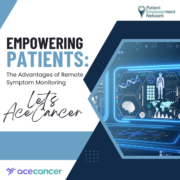How Can a Prostate Cancer Social Worker Help You?
How Can a Prostate Cancer Social Worker Help You? from Patient Empowerment Network on Vimeo.
How can a prostate cancer social worker help patients and their families? Linda Mathew, a senior social worker, shares how she provides support for patients and their loved ones after diagnosis, during treatment, and beyond.
Linda Mathew is a Senior Clinical Social Worker at Memorial Sloan Kettering Cancer Center. Learn more here.
See more from The Pro-Active Prostate Cancer Patient Toolkit
Related Resources

|

|

|
Transcript:
Linda Mathew:
Hi, I’m Linda Mathew, and I am a senior social worker here at MSK. I am a supervisor in the Department of Social Work, but I also have a service, and I work with the urology service, so, both medicine and surgical patients.
And, really, it’s just – I’m here as clinical support to our patients in terms of individual counseling, couples counseling, family counseling.
So, what we really do is we provide supportive counseling to our patients. So, in terms of when we say “supportive counseling,” if patients are anxious, or have some depression around the diagnosis, or have just fears around what that – what it means to have a cancer diagnosis and the uncertainty about what that journey will look like, they are referred to me to just process that out loud in terms of questions about themselves and how – how are they going to manage a diagnosis if they’re going to be on chemotherapy or questions about how to support their family around this diagnosis if they don’t even know how to have this conversation with their family.
Most times, if it’s a couple that come in, it’s around how do I support the patient as well as the caregiver through the trajectory of this patient’s treatment. So, the patient is dealing with their own diagnosis and treatment and what all that means, and the caregiver is also having a parallel process with this where they are caring for the loved one, but also have their own fears about “How do I navigate being a support to them? I don’t know what it means to be a caregiver for somebody who’s going through medical treatment.”
So, we help slow that down for them and say, “These are the things that you need to look out for. Just – you are their extra advocate. You are that person – their eyes, their ears – when they are not able to call the doctor’s office to be able to say, ‘I can call the doctor’s office with this information. Just tell me what you want me to say.’”
But, you’re also just there as a support, so it’s a really weird kind of…reminding our patients the tools that they already have, but because they feel like they’re in a crisis, they forget what those tools are.
Please don’t feel like you have to figure this out on your own. Your medical team is here for you, social work is here for you, we have an ancillary service – like, services available in terms of the men’s sexual health clinic integrated medicine counseling venture, all in terms of supporting our patients. So, when in doubt – and, if you don’t know who to turn to, just turn to your social worker and ask them. Say, “I need help,” and we’ll guide you through it.









